




When it comes to choosing a washing machine, one of the major decisions you will have to make is whether to go for a front loader or a top loader. Both types of washing machines have their own advantages and disadvantages, so it’s important to weigh them carefully before making your decision.
Front loader washing machines have become increasingly popular in recent years for a number of reasons. One of the main advantages of a front loader is that it is generally more energy efficient than a top loader. This is because front loaders use less water and electricity to operate, saving you money on your utility bills. Additionally, front loaders are known for their gentle washing action, which is especially beneficial for delicate fabrics.
On the other hand, top loader washing machines have their own set of advantages. One of the main advantages of a top loader is that it is generally more affordable than a front loader. Additionally, top loaders tend to have larger capacities, allowing you to wash more clothes in a single load. Top loaders also offer the flexibility of adding and removing clothes during the wash cycle, which can be convenient if you have forgotten to add something.
In conclusion, both front loader and top loader washing machines have their own pros and cons, and the right choice for you will depend on your specific needs and preferences. If energy efficiency and gentle washing are important to you, a front loader may be the best option. However, if affordability, capacity, and flexibility are your priorities, a top loader may be the way to go. Ultimately, the best washing machine for you is the one that fits your budget and meets your laundry needs.
The Front Loader vs. Top Loader Washing Machine Debate
When it comes to choosing a washing machine, many people find themselves in a dilemma: should they go for a front loader or a top loader? Both types of machines have their own advantages and disadvantages, making it a difficult decision for consumers.
Front Loader Washing Machines
Front loader washing machines have gained popularity in recent years due to their energy efficiency and water-saving features. These machines use less water than top loaders, making them more environmentally friendly. Additionally, front loaders are known for their excellent cleaning performance, as they typically have more wash cycles and options to choose from.
- Advantages of Front Loader Washing Machines:
- Energy efficient: Front loaders use less energy, which can lead to cost savings on your utility bills.
- Water saving: With their low water usage, front loaders can help conserve water.
- Better cleaning performance: Front loaders provide a thorough clean and are suitable for all types of fabrics.
- Disadvantages of Front Loader Washing Machines:
- Longer wash cycles: Front loaders generally take longer to complete a cycle compared to top loaders.
- Initial cost: Front loaders tend to be more expensive than top loaders, although they can save you money in the long run.
- Mold and mildew issues: If not properly maintained, front loaders can be prone to mold and mildew buildup.
Top Loader Washing Machines
Top loader washing machines have been a staple in many households for years. They are known for their convenience and faster wash cycles. Additionally, top loaders are easier to load and unload compared to front loaders, as you don’t have to bend down to access the drum.
- Advantages of Top Loader Washing Machines:
- Quicker wash cycles: Top loaders usually have shorter cycle times, making them ideal for busy individuals.
- Lower initial cost: Top loaders are generally more affordable upfront compared to front loaders.
- No mold problems: The design of top loaders minimizes the risk of mold and mildew buildup.
- Disadvantages of Top Loader Washing Machines:
- Less energy efficient: Top loaders typically use more energy and water per cycle compared to front loaders.
- Possible tangling of clothes: The agitator in top loaders can sometimes cause clothes to tangle or get damaged.
- Not suitable for delicate fabrics: Some top loaders may not have gentle enough cycles for delicate fabrics.
Ultimately, the choice between a front loader and a top loader washing machine depends on your individual needs and preferences. Consider factors such as energy efficiency, cleaning performance, cost, and convenience when making your decision. Whichever type you choose, proper maintenance and care will ensure that your washing machine lasts for years to come.
Efficiency and Energy Consumption
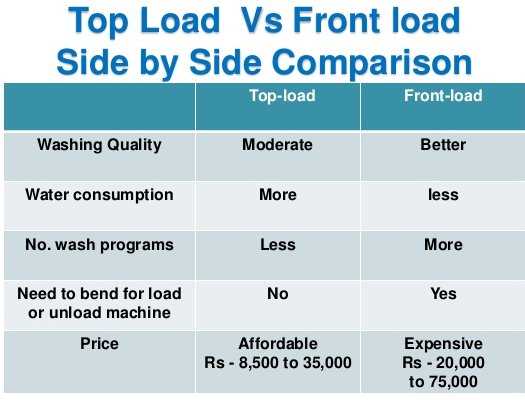
When it comes to efficiency and energy consumption, front loader and top loader washing machines have different characteristics.
Front Loader Efficiency
Front loader washing machines are typically more efficient when it comes to water usage. They use less water compared to top loader machines because they use a tumbling action instead of filling the drum with water. This not only reduces water consumption but also results in better cleaning performance.
Additionally, front loader machines spin at higher speeds during the wash and rinse cycles, which means clothes come out drier. This can help reduce drying time, saving energy in the process.
Top Loader Efficiency
On the other hand, top loader machines have been improving their efficiency in recent years. Some models now offer features like load sensing, which adjusts the water level based on the size of the load, reducing water waste. However, top loader machines still generally use more water compared to front loader machines.
Top loader machines also tend to have longer wash cycles, which can increase energy consumption. The agitator in top loader machines may provide a more thorough clean for heavily soiled clothes, but it also requires more energy to operate.
Energy Consumption
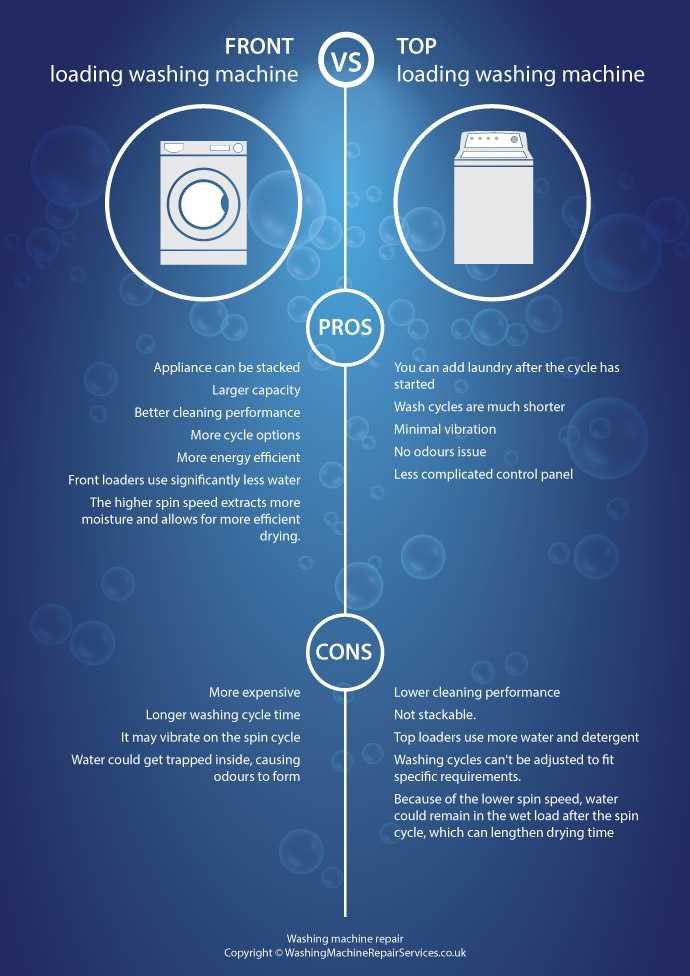
Both front loader and top loader washing machines come with different energy efficiency ratings. It’s important to look for machines with higher energy efficiency ratings, such as those labeled with Energy Star certification. These machines are designed to consume less energy and save you money on your utility bills.
Additionally, consider the type of energy used by the washing machine. Some machines offer options for using hot or cold water, while others only use cold water. Using cold water can significantly reduce energy consumption, as heating water accounts for a large portion of a washing machine’s energy usage.
Conclusion
When it comes to efficiency and energy consumption, front loader washing machines are generally more efficient in terms of water usage. However, top loader machines have been improving and may offer features that can help reduce water waste. Pay attention to energy efficiency ratings and consider using cold water whenever possible to further reduce energy consumption.
Water Usage and Conservation
One important factor to consider when choosing between a front loader and top loader washing machine is water usage and conservation. The amount of water used by these machines can vary significantly, so it’s important to understand how each type affects water consumption.
Front Loader Washing Machine
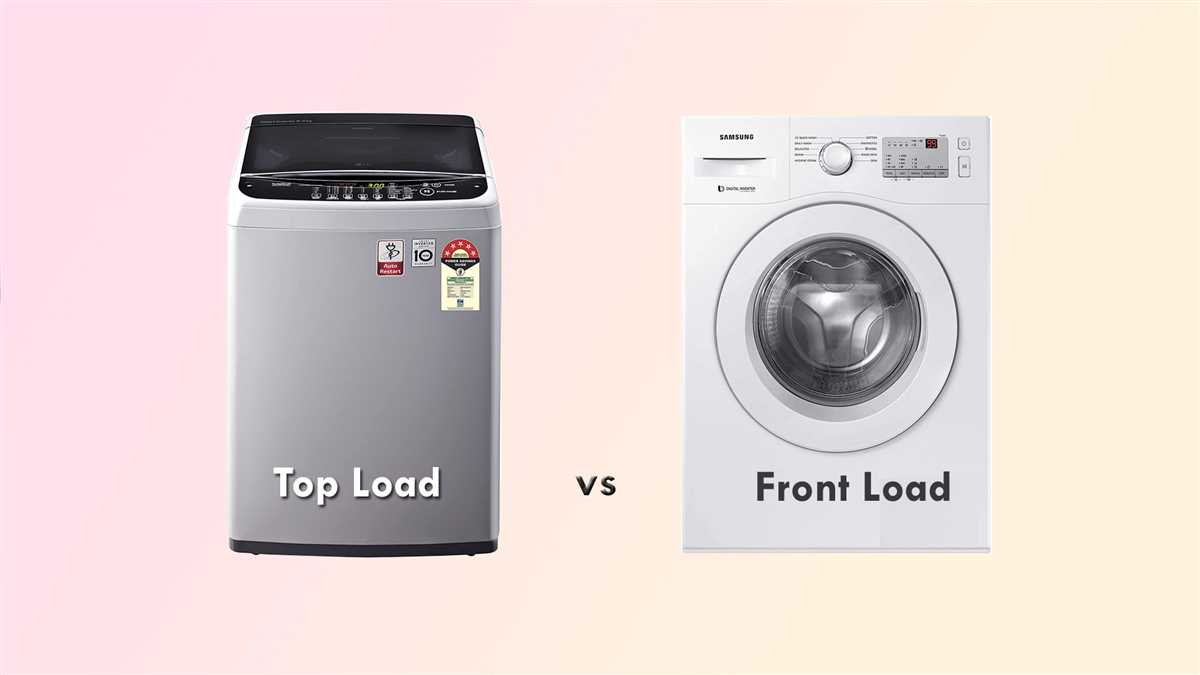
Front loader washing machines are known for their efficiency and water-saving features. These machines use less water compared to top loader machines, primarily due to their design. Front loaders typically have a horizontal axis drum that rotates on its side, allowing clothes to be tumbled through water and detergent. Since the drum is placed horizontally, it requires less water to wash the same amount of clothes as a top loader. Additionally, front loaders use less energy because they require less water to heat, leading to further water conservation.
Top Loader Washing Machine
Top loader washing machines, on the other hand, typically use more water during a wash cycle compared to front loaders. These machines have a vertical axis drum that fills up with water and agitates the clothes to remove dirt and stains. The vertically aligned drum requires more water to fully immerse the clothes and ensure thorough cleaning. While some newer top loader models are designed to be more water-efficient, they still generally use more water than front loaders.
Conservation Tips
To conserve water when using a washing machine, regardless of whether it’s a front loader or top loader, consider the following tips:
- Always wash full loads to maximize the efficiency of water usage.
- Use the appropriate water level setting for the load size. Avoid unnecessarily high water levels.
- Choose shorter wash cycles whenever possible to reduce water consumption.
- Consider using eco-friendly detergents that require less water to rinse off.
- Re-purpose or reuse graywater from the washing machine for other purposes, such as watering plants or cleaning.
By implementing these conservation tips, you can reduce water waste and contribute to a more sustainable lifestyle.
In conclusion, front loader washing machines are generally more water-efficient compared to top loader machines. However, regardless of the type of washing machine you choose, there are always ways to conserve water and minimize water waste.
Washing Performance
One of the primary factors to consider when choosing between a front loader and a top loader washing machine is the washing performance. Both types of machines have their own advantages and limitations in terms of how well they clean your clothes.
Front Loader Washing Machine
Front loader machines are known for their superior washing performance. This is because they use a tumbling action to clean the clothes, which is more effective in removing dirt and stains. The drum of a front loader rotates in both directions, allowing the clothes to be lifted and dropped repeatedly. This helps to agitate the clothes and remove any dirt or stains.
Front loaders also have higher water efficiency compared to top loaders. They use less water per cycle, resulting in better cleaning performance. Additionally, front loaders usually have longer wash cycles, allowing more time for the detergent to penetrate and break down stains.
Top Loader Washing Machine
Top loader machines, on the other hand, have their own advantages when it comes to washing performance. They generally have shorter wash cycles compared to front loaders, which can be beneficial if you are looking for a quick wash. However, this shorter cycle time may not provide the same level of cleaning performance as a front loader.
Top loaders also tend to have agitators or impellers inside the drum, which can sometimes be rougher on delicate fabrics. This may result in a less gentle wash, especially for items that require extra care.
Conclusion
When it comes to washing performance, front loaders have the edge over top loaders. They tend to provide a more thorough clean and are more water-efficient. However, if you value shorter cycle times and don’t have many delicate items, a top loader can still do a decent job.
| Front Loader | Top Loader | |
|---|---|---|
| Washing Performance | Superior | Decent |
| Water Efficiency | High | Lower |
| Wash Cycle Duration | Longer | Shorter |
| Gentleness | Gentler | Rougher (due to agitators/impellers) |
Load Capacity and Flexibility
One of the key factors to consider when choosing between a front loader and a top loader washing machine is load capacity and flexibility. The load capacity refers to the amount of laundry that can be washed in a single cycle.
Front Loader:
- Front loader washing machines typically have a larger load capacity compared to top loaders.
- Most front loaders have a load capacity ranging from 7 to 9 kg, allowing you to wash more clothes in each load.
- The larger load capacity of front loaders is beneficial for families or individuals who have a lot of laundry to wash regularly.
Top Loader:
- Top loader washing machines usually have a smaller load capacity compared to front loaders.
- The load capacity of top loaders typically ranges from 5 to 6 kg, although some models may offer larger capacity options.
- Top loaders are well-suited for individuals or small households with less laundry to wash.
Flexibility:
Front loaders offer more flexibility in terms of load capacity and the types of wash cycles available. They often have a variety of wash programs, such as delicates, quick wash, heavy-duty, and more. This allows you to customize the wash cycle based on the type of clothes you are washing.
On the other hand, top loaders are generally simpler in terms of wash cycles and settings. They may have basic options like normal, delicate, and heavy-duty, but they may not offer as many specialized programs as front loaders.
In Summary:
| Front Loader | Top Loader |
|---|---|
| Generally larger load capacity | Smaller load capacity |
| Beneficial for families or individuals with more laundry | Suitable for individuals or small households with less laundry |
| More wash cycle options and flexibility | Simple wash cycles and settings |
Maintenance and Durability
Comparison of Maintenance
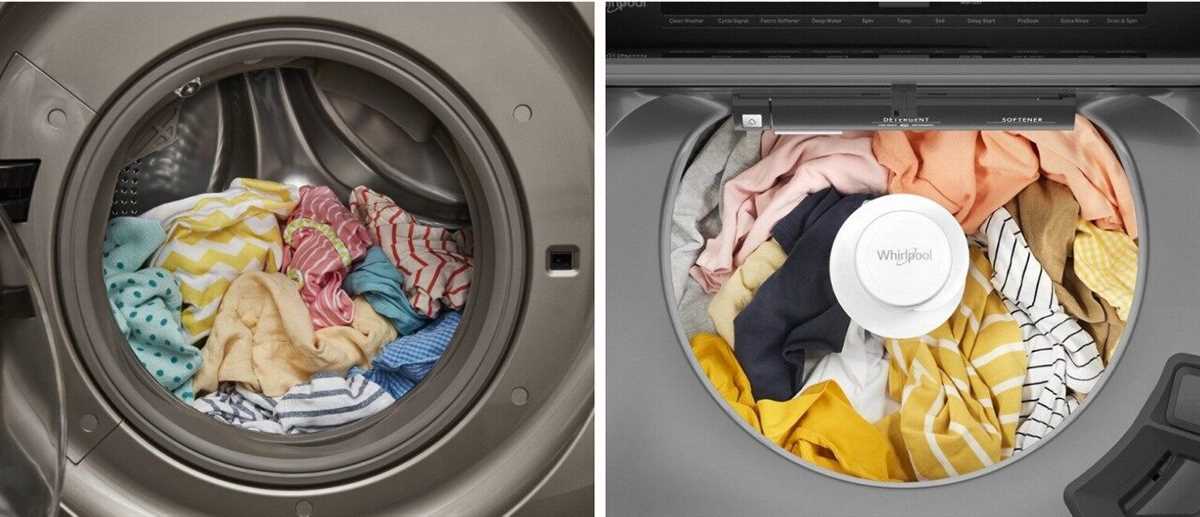
Maintenance is an important factor to consider when choosing between a front loader and a top loader washing machine. Both types require regular cleaning and upkeep to ensure optimal performance and longevity.
- Front Loader: Front loader washing machines generally require more maintenance compared to top loaders. They are prone to develop mold and mildew due to their design, where water can easily accumulate in the door gasket or detergent drawer. Regular cleaning of these areas is necessary to prevent odors and keep the machine functioning effectively. Additionally, front loaders may have filters that need cleaning to prevent clogs and improve performance.
- Top Loader: Top loader washing machines are typically easier to maintain compared to front loaders. They generally do not have issues with mold or mildew as water does not remain stagnant in the drum. However, regular cleaning of the drum and detergent tray is still recommended.
Durability
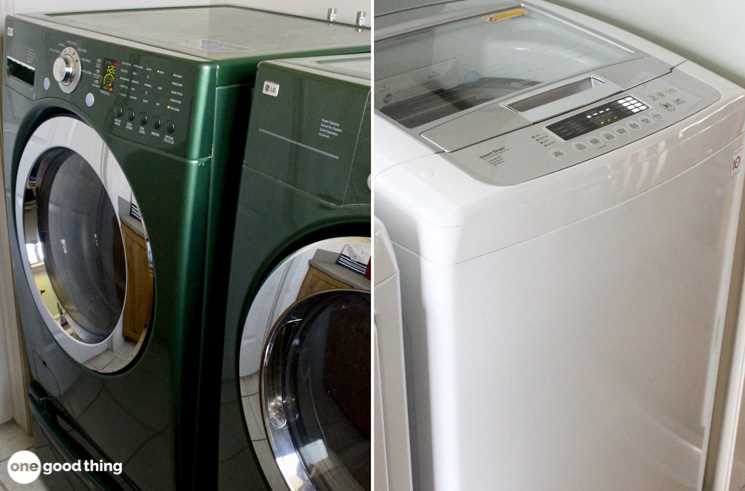
When it comes to durability, both front loader and top loader washing machines can offer long-lasting performance if properly maintained. However, there are some differences to consider:
- Front Loader: Front loader washing machines are known for being more gentle on clothes due to their tumbling action, which can reduce wear and tear. This can potentially result in longer garment lifespan. However, some front loaders may have issues with parts such as the door gasket or electronic controls, which may require repairs over time.
- Top Loader: Top loader washing machines generally have simpler designs with fewer parts that can potentially break or malfunction. They are generally more durable and may require fewer repairs compared to front loaders. However, the agitator in some top loaders may be more rough on clothes, potentially leading to faster wear and tear.
Ultimately, the durability of a washing machine also depends on factors such as brand, model, and frequency of use.
FAQ
What is the difference between a front loader and a top loader washing machine?
A front loader washing machine has a door on the front of the unit through which clothes are loaded, while a top loader has a lid on the top of the unit.
Which type of washing machine is more energy efficient?
Front loader washing machines are generally more energy efficient than top loader washing machines. They use less water and require less energy to operate.
Are front loader washing machines more expensive?
Front loader washing machines tend to be more expensive upfront compared to top loader washing machines. However, they can help save money in the long run due to their energy efficiency.
Which type of washing machine is better for large loads?
Front loader washing machines are typically better for large loads as they have a larger capacity and can accommodate more clothes.
Do front loader washing machines have any advantages over top loaders?
Yes, front loader washing machines have several advantages over top loaders. They are more energy efficient, gentler on clothes, and often have more features and options.











